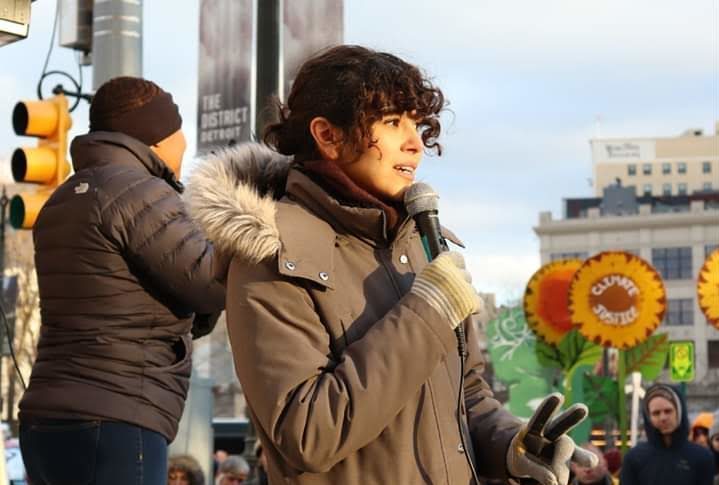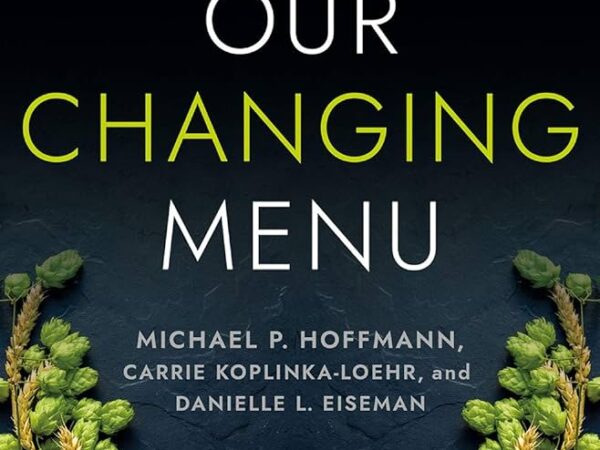
Detroit’s Michelle Martinez is acutely aware of the patience needed when your profession is advocating for environmental justice, the fair and meaningful involvement of all people related to environmental laws and policies.
Martinez is acting executive director and statewide coordinator for the grassroots Michigan Environmental Justice Coalition.
It was 1994, almost three decades ago, that President Bill Clinton signed Executive Order 12898 putting the federal spotlight on environmental justice. But subsequent presidents failed to make EJ the priority the order required.
In addition to the requisite patience, Martinez has the respect of her Detroit colleagues.
Martinez knows what’s important, which means if she’s involved, it’s a worthwhile project, University of Detroit Mercy environmental law attorney Nick Schroeck told Great Lakes Now.
On her personal attributes, “Michelle has a combination of smarts, passion, judgment and drive that makes her unique as an advocate and organizer,” Schroeck said.
After those decades of inertia comes President Joe Biden with a big environmental and climate agenda, and Martinez wants everyone to “get excited” about Biden’s plans and early action.
Great Lakes Now senior correspondent Gary Wilson recently talked with Martinez about her work, including what inspired her return to Detroit when there was little hope for the city’s recovery.
She touched on “Biden’s big step” and Michigan’s environmental justice progress under Gov. Gretchen Whitmer, plus the recent “sad decision” Michigan made regarding the Line 5 oil pipeline.
The interview was conducted on the phone and via email. It was recorded, transcribed and edited for clarity.
Great Lakes Now: With a graduate degree in environment and sustainability from the University of Michigan in hand, you returned to Detroit in 2008 after being away for years. Detroit’s comeback had not yet begun, and the city’s situation was bleak. Besides family connections, what brought you back to Detroit?
Michelle Martinez: That’s a great question. Detroit is a city that is vibrant, the home of Motown and the labor movement. We had Henry Ford’s five dollars a day and people came here from all over the world calling it a city of dreams, and that is what I believe.
The revolutionary Grace Lee Boggs who adopted Detroit as her hometown famously said, in Detroit, the human scale of visionary projects is alive. We have neighborhoods that bind together in hardship. And more, brilliant art and culture has emerged from this struggle. That part of the fabric of Detroit is what inspires me. Beyond the corporate bailouts and the shiny downtown, there are real families in neighborhoods and communities that have endured over these many years by locking arms and creating community.
GLN: In 2008 you did an internship for Sierra Club in Detroit’s notorious 48217 Zip Code, one of the most polluted areas of Michigan. Your task was to demonstrate to the then Department of Environmental Quality that there was a cancer cluster there, and you did. What’s the status of 48217 today?
MM: Zip Code 48217 is a prime example of what community organizing does and the power of grassroots action. Members who came together to push the state to do the cancer cluster analysis have also pushed Marathon Oil to invest in the community, and nothing is more emblematic of that than the Kemeny Recreation Center. It’s the first time in some time that any recreation center (in the area) has been renovated and is now a place for community members of 48217 to go. It’s a testament to their hard work.
More needs to be done continuing to push the U.S. EPA for coming into compliance with federal regulations on sulphur dioxide, ozone and particulate matter to reduce pollution. That’s exactly what the community continues to fight for, clean and breathable air and other services from the city like healthcare and clinics. Congratulations to 48217 for continuing to carry the torch of community work for what the community actually needs.
GLN: After four years of hearing little about environmental justice from the administration of former President Donald Trump, President Biden in his first weeks has made it a priority. What has he done, and what’s important for him to do in Michigan and the Great Lakes region?
MM: Let’s all get excited about Biden’s recent actions, the civilian conservation corps, agricultural investment and union jobs. Black and brown communities who have borne the brunt of environmental contamination and pollution are also at the center of that. We saw bold actions that are a great first step to get us where we need to be by 2030. They include the goal of spending 40% of sustainability investments in communities that have been hit the hardest by environmental contamination.
Those are cities like Detroit, Kalamazoo, even Grand Rapids plus Flint, where we can see big changes in investment to deal with existing contamination from legacy pollution and due to extreme disinvestment. One of our EJ leaders here in Detroit says, “We need to clean up before we green up.” Money needs to go to that legacy contamination and for enforcement by U.S. EPA, so we can start to lay the groundwork for our new economy in clean and green energy.
Watch Great Lakes Now‘s segment on the Biden administration and climate change:
API key not valid. Please pass a valid API key.GLN: Former presidents George H.W. Bush, Bill Clinton and Barack Obama talked about environmental justice with good intentions but seemingly little happened in their tenure. How does President Biden keep his EJ initiatives from getting lost, given his long list of competing priorities which include COVID-19, the economy and dealing with social unrest?
MM: Biden took a big step by reinforcing the Clinton EJ executive action from the 1990s, and he’s going to reinforce that. We’ll need strong action from Congress to make sure that actually happens. While the EPA is in charge of enforcing existing law, a lot can be done with enforcing laws that govern pollution contamination coming from smokestacks that enter our water. We’re going to need congressional action.
There have been some exciting things from Congress (in recent weeks), including an EJ mapping tool and a water is a human right and water is life bill from our own Rep. Rashida Tlaib. We’re looking forward to those things which can shore up some of the most critical and urgent problems in environmental justice communities.
GLN: Michigan Gov. Gretchen Whitmer appointed an EJ Public Advocate after taking office in 2019, an outgrowth of the Flint water crisis. But you told Great Lakes Now last August that the department is “still measuring success by citing processes and procedures instead of outcomes.” Has that changed?
MM: Absolutely, for 10 years environmental justice advocates have hoped that we would get an EJ council, an EJ ombudsman, and those were the first actions that Whitmer took in 2019. Since that time, the Michigan Advisory Council on Environmental Justice has laid the groundwork for water affordability and health in energy decision making. That was evidenced by her executive order in September 2020 hoping to catalyze the MI Healthy Climate plan and other actions that direct our departments to make the kind of decisions they need to make.
So, a great first step. We need to take those bold actions so that we can meet our climate targets by 2030, which is when the United Nations said some of the most catastrophic events will start to take place globally.
GLN: Gov. Whitmer last year established carbon neutrality by 2050 as a goal. Recently Michigan’s Department of Environment, Great Lakes, and Energy issued permits allowing Enbridge to construct the pipeline in a tunnel to replace Line 5. If built, it will lock the state into energy transport for decades. How do you reconcile the conflicting positions?
MM: This is a really sad decision that’s moving Michigan in the wrong direction. Approval of the heavy oil tunnel that threatens our most precious Great Lakes is the wrong decision. Even moving some hazardous waste into Detroit, again, was the wrong permitting decision.
We really need our agencies to stand up for our future, for a new economy, for creation of strong jobs and indicators that we’re moving in the direction of a clean energy economy. The substantive action to reign in pollution and not continue to advance false solutions that empower corporations to invest in the wrong direction is absolutely what Michigan needs. Repeatedly we’ve seen in polls that Michiganders overwhelmingly believe clean water and clean air are critical parts to investing in our future.
That’s definitely true for black and brown Detroiters and other cities across this state. So, more aggressive action by the Whitmer administration is welcome and with the federal government coming into alignment with investment, hopefully we’ll be able to make strides in that direction.
GLN: As climate plans unfold including Michigan’s, you’ve cautioned against use of market-based solutions like cap and trade? What’s your objection?
MM: There are so many amazing climate solutions right at our fingertips starting with renovating our homes, schools and buildings with efficient electric and renewable energy, using distributed energy, reinvesting in regenerative agriculture, ecosystem restoration, waste-free food systems, and state-of-the-art transit systems all the while creating and keeping jobs at home. Carbon markets are a red herring, a false solution and a distraction burning the scant amounts of time we have to save ourselves and this planet.
GLN: The wheels of progress on environmental and EJ issues historically have turned slow. It can take years and decades to show results. What keeps you going?
MM: This is a great time to be alive. We have so much hope and energy, and it’s building. As people become aware of climate change and the threats that are bearing down on us, more people are getting involved. In this last election, millions of people hit the polls and we had folks out there making sure their neighbors voted. We need to keep up that energy and start to bring the next generation of millennials and Gen Z into the movement in a way that will continue to grow and inspire us in creative and imaginative voice.
GLN: And this inspires you to keep your shoulder to the grindstone even when the odds are long?
MM: Absolutely, imagination is going to save us and the energy and hope behind it really keeps our communities together as we continue to fight for social justice.
GLN: You have a 7-year-old who will be venturing into the world in 10 years. What improvements would you like to see for him?
MM: When I think about where we need to be in 2030, I can imagine bringing our economies home, center our health, Earth, and put people to work to restore ecosystems rather than exploit the natural systems we live in.
And the generation that’s going through school now should be taking advantage of an education for the regenerative economy, restoring land, creating sustainable food systems and making sure our textiles and our energy are produced in a sustainable way with wages and care for our elders, our children and communities.
Those are the kind of things I’m excited about for Michigan as stewards of one of the world’s most precious resources, the Great Lakes. We should take that seriously not only for this future generation but for the next seven generations.
Catch more news on Great Lakes Now:
Biden environmental challenge: Filling vacant scientist jobs
Biden climate team: “Hard work ahead” to rebuild climate efforts
Intersecting Crises: Fighting for climate justice in a pandemic
Demanding Justice: Detroit activists make formal complaint over hazardous waste sites
API key not valid. Please pass a valid API key.Featured image: Michelle Martinez (Credit: Valerie Jean via Michelle Martinez)




